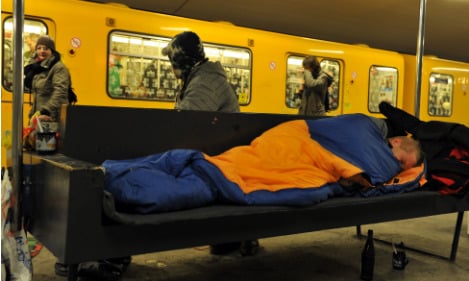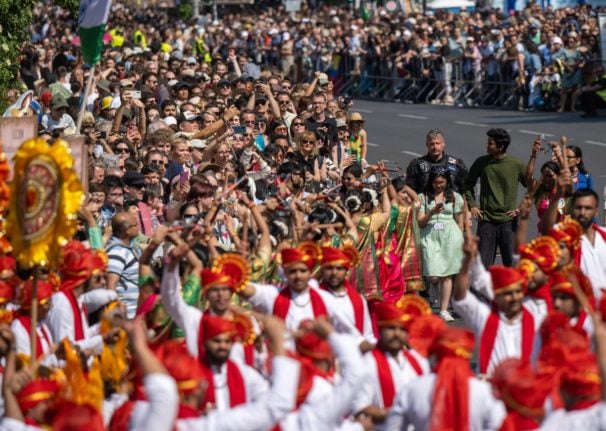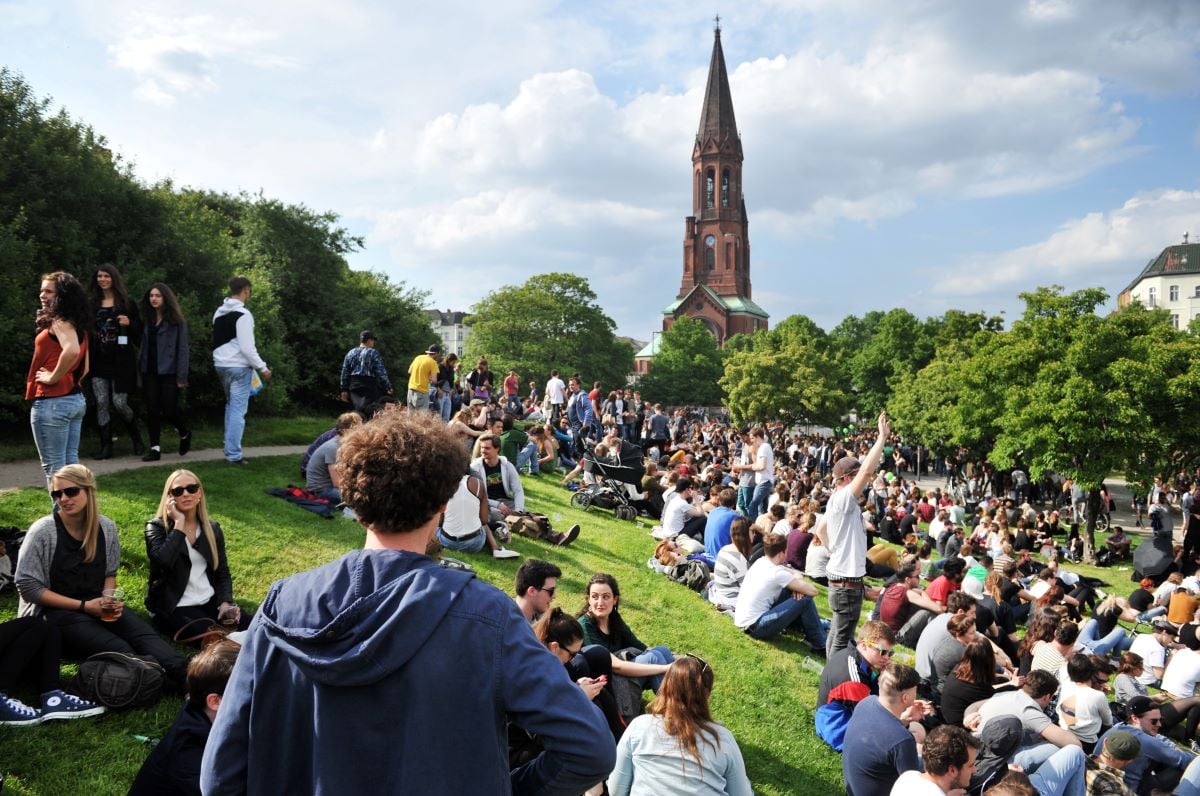Since its reunification in 1990, Berlin has developed into a thriving, cosmopolitan centre.
Dubbed “poor but sexy” by its former mayor, it has attracted creative types like moths to a flame with its low rents and exploding startup scene.
Tourists flock to this grungy vibe too, with nearly six million visiting in the first six months of this year alone.
But the reality is that the city is struggling with poverty, unemployment, poor infrastructure, a floundering education system, debt, the refugee crisis and crime.
Its chronic problems led national newspaper Die Welt to label it a “failed state” in 2014. Here are a few reasons why Berlin has earned this uncomfortable moniker.
1. Six years behind schedule, the airport still hasn’t been opened.
 Berlin's never-ending story: BER airport. Photo: Robert Aehnelt/Wikimedia Commons.
Berlin's never-ending story: BER airport. Photo: Robert Aehnelt/Wikimedia Commons.
Berlin is hardly unique in Germany when it comes to embarrassing mega projects. Anyone acquainted with Stuttgart's underground central station or Hamburg's new concert hall knows that cliches about German efficiency hold little water.
But there is something spectacular about how Berlin has failed to open the Berlin-Brandenburg airport. Its launch has been postponed repeatedly since 2011 due to planning failures and amid corruption accusations. Few people believe the city's claim that it will open next year.
Upon his resignation in 2014, former mayor Klaus Wowereit described the fiasco as the biggest failure of his 13-year term in office.
The original projected costs of the airport have more than doubled. By 2017, some estimate the taxpayer will have forked out over €5 billion for it.
To pick just the most recent of years of negative headlines, this week a former senior employee admitted to taking €150,000 in bribes from a subcontractor.
2. In comparison to Germany as a whole, Berlin is swimming in debt.
While debt is increasing in other Bundesländer – with Hamburg's debt rising from €26 billion in 2014 to €26.7 billion in 2015 – it is decreasing in Berlin, with the capital's debt dropping from €59.8 billion in 2014 to €59.2 billion in 2015.
Despite this, Berlin's debt still overshadows that of other states, towering above Bavaria's €36.9 billion.
While capitals are often the economic power houses of their respective countries, Berlin is heavily reliant on the rest of the Bundesrepublik. In fact, it is the only European capital which is a drain on its country's overall economy, a study by the Cologne Institute for Economic Research demonstrated.
Germany has a system of fiscal equalisation which tries to eliminate financial inequalities between states. Berlin is the largest recipient of payments, receiving over €3.6 billion last year. By contrast, Bavaria is the biggest contributor to the scheme, providing over €5.4 billion.
3. Berlin is struggling to provide adequate care for refugees.
 Fights break out as refugees clamour to receive an appointment at Berlin's asylum seeker registration centre. Photo: DPA.
Fights break out as refugees clamour to receive an appointment at Berlin's asylum seeker registration centre. Photo: DPA.
At the height of the refugee crisis last year, 500 asylum seekers were arriving daily at the capital’s main registration centre, known as LaGeSo, but only 200 could be given an appointment on a given day, an employee told the Berliner Zeitung last December.
“Our leadership is completely overwhelmed”, the employee said.
“The files we’ve put on hold are mounting up in boxes. We store them in several rooms. There is no system to it, which is why we have come up with a job called 'the seeker' – someone whose only task is to find the necessary file,” said another.
Refugees have queued outside LaGeSo in temperatures as high as nearly 40C and as low as -8C in recent years.
Antje Kapek, leader of the Green Party in Berlin, talking to the city parliament in June described the situation as “disgraceful”.
4. Berlin’s crime rate is higher than in all the other German states.
In 2015, Berlin experienced the highest crime rate of all the Bundesländer, according to the Federal Interior Ministry’s crime statistics.
The capital reported 16,414 cases per 100,000 people, above Hamburg’s 13,839, Bremen’s 13,784, Saxony’s 8,893, and the national average of 7,797.
Berlin’s overall crime rate increased by 4.9 percent between 2014 and 2015.
During this period, while murder and manslaughter decreased by 14.5 percent and robbery fell by 5.1 percent, shop theft increased by 14 percent, bag theft rose by 25.8 percent and basement break-ins increased by 34.6 percent, police crime statistics for the capital showed.
5. Unemployment and poverty are very real issues.
 Photo: DPA.
Photo: DPA.
In 2015, the capital had the second-highest unemployment rate of all the German states, with 10.7 percent of the working-age population jobless, while the overall national rate was 6.4 percent. In Hamburg the rate was 7.4 percent of Hamburgers and in Bavaria it was 3.6 percent.
While only 4.3 percent of people in Baden-Württemberg and 3.6 percent of people in Bavaria receive Hartz IV welfare benefits, 16.4 percent of Berliners receive this funding.
But not only that: 20 percent of Berliners are classified as “in danger of poverty” (receiving less than 60 percent of the median national income for private households), compared to Bavaria’s 11.5 percent and Baden-Württemberg’s 11.4 percent.
A Berlin branch of the Catholic welfare organisation Caritas e.V. reported that between 2014 and 2015, the number of treatments given to homeless people and people without insurance increased by a third at their local treatment centre.
And those who aren't sleeping on the streets of the capital still earn less than people in many other German states.
In 2014, the disposable income in private households per inhabitant was €18,594 in Berlin, in comparison to Bavaria’s €23,080 and Hamburg’s €23,596.
6. The capital has the worst education system in the Bundesrepublik.
One of the reasons behind the city's plight may just be its poor education system.
Berlin's education system trailed in last place in the Bildungsmonitor 2016, an analysis by the Cologne Institute for Economic Research for the think tank New Social Market Economy Foundation.
Saxony and Thuringia took the top spots in the survey.
In 2014, the dropout rate in Berlin schools was 8.1 percent compared to the national average of 5.5 percent, and 39.7 percent of students did not complete their vocational training compared to the national average of 27.7 percent, the survey demonstrates.
By Max Bringmann and Verity Middleton
Correction: A previous version of this article incorrectly stated the amount of money Berlin receives and Bavaria contributes in Germany's fiscal equalization plan.





 Please whitelist us to continue reading.
Please whitelist us to continue reading.
Member comments